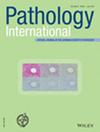Clinicopathological importance of Bcl-2 and p53 in postmenopausal triple-negative breast carcinoma and association with age.
IF 2.5
4区 医学
Q2 PATHOLOGY
引用次数: 0
Abstract
Appropriate biomarkers are required to predict the clinical outcome of triple-negative breast cancer (TNBC). In this study, we focused on the clinical importance of two representative tumor-associated proteins, Bcl-2 and p53. Bcl-2 expression is usually related to estrogen receptor expression and a favorable outcome in breast cancer. TNBC has been reported to show a high frequency of p53 positivity suggesting TP53 mutations. The expressions of Bcl-2 and p53 were immunohistochemically examined in TNBC involving two age groups of postmenopausal women (≥75 y/o, n = 75; 55-64 y/o, n = 47), who underwent surgery without neoadjuvant therapy. We examined their associations with each other, or with clinicopathological factors including the outcome. Bcl-2 expression was inversely correlated with androgen receptor, apocrine morphology, and p53 expressions, and was an independent predictor of a poor outcome in total or in younger women. p53 positivity was associated with a more favorable outcome than p53 negativity in the younger group. In combined analyzes, none of the twenty Bcl-2-negative/p53-positive cases in the younger group exhibited recurrence, resulting in the independent favorable predictive value of Bcl-2-negative/p53-positive. The anti-apoptotic nature of Bcl-2 may be apparent in TNBC. The excellent outcome of Bcl-2-negative/p53-positive cases in the younger group warrants further combined investigation of Bcl-2/p53 in TNBC.绝经后三阴性乳腺癌中 Bcl-2 和 p53 的临床病理学重要性以及与年龄的关系。
预测三阴性乳腺癌(TNBC)的临床结果需要适当的生物标志物。在本研究中,我们重点研究了两种具有代表性的肿瘤相关蛋白--Bcl-2 和 p53 的临床重要性。Bcl-2 的表达通常与雌激素受体的表达和乳腺癌的良好预后有关。有报道称,TNBC的p53阳性率很高,这表明TP53发生了突变。我们用免疫组化方法检测了两个年龄组绝经后妇女(≥75 岁/o,n = 75;55-64 岁/o,n = 47)TNBC 中 Bcl-2 和 p53 的表达,这些妇女接受了手术,但没有接受新辅助治疗。我们研究了它们之间的关系,或与临床病理因素(包括预后)之间的关系。Bcl-2的表达与雄激素受体、腺体形态和p53的表达成反比,是预测所有女性或年轻女性不良预后的独立指标。在综合分析中,年轻组的 20 例 Bcl-2 阴性/p53 阳性病例中没有一例出现复发,因此 Bcl-2 阴性/p53 阳性具有独立的有利预测价值。Bcl-2的抗凋亡特性在TNBC中可能很明显。年轻组中Bcl-2阴性/p53阳性病例的良好预后值得进一步对TNBC中的Bcl-2/p53进行联合研究。
本文章由计算机程序翻译,如有差异,请以英文原文为准。
求助全文
约1分钟内获得全文
求助全文
来源期刊

Pathology International
医学-病理学
CiteScore
4.50
自引率
4.50%
发文量
102
审稿时长
12 months
期刊介绍:
Pathology International is the official English journal of the Japanese Society of Pathology, publishing articles of excellence in human and experimental pathology. The Journal focuses on the morphological study of the disease process and/or mechanisms. For human pathology, morphological investigation receives priority but manuscripts describing the result of any ancillary methods (cellular, chemical, immunological and molecular biological) that complement the morphology are accepted. Manuscript on experimental pathology that approach pathologenesis or mechanisms of disease processes are expected to report on the data obtained from models using cellular, biochemical, molecular biological, animal, immunological or other methods in conjunction with morphology. Manuscripts that report data on laboratory medicine (clinical pathology) without significant morphological contribution are not accepted.
 求助内容:
求助内容: 应助结果提醒方式:
应助结果提醒方式:


